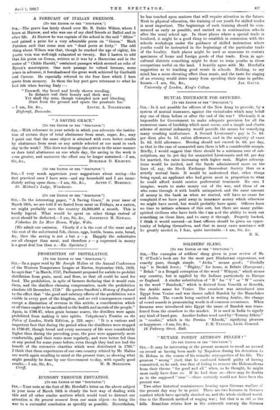PROHIBITION OF DISTILLATION.
[To THE EDITOR OF THE " SPECTATOR.”1 Sin,—In a paper read by Mr Joseph Matins at the Annual Conference of the Western Temperance League at Exeter, September 18th, 1889, he sayi that "in March, 1757, Parliament proposed for awhile to prohibit distillation from grain, meal, and flour, so that all could be used for food. The prohibition, in spite of farmers declaring that it would ruin them, and the distillers claiming compensation, made the prohibition absolute till December, 1759." He quotes Smollett's History of England to the effect that "the good and salutary effects of the prohibition a 070 visible in every part of the kingdom, and no evil consequences ensued except a diminution of revenue in this article, a consideration which at all times ought to be sacrificed to the health and literals of the people." Again, in 1796-97, when grain became scarce, the distillers were again prohibited from making it into spirits. Colquhoun's Treatise on the Police of London, Sixth Edition, p. 328, says : "It is a curious and important fact that during the period when the distilleries were stopped in 1796-97, though bread and every necessary of life were considerably higher than during the preceding year, the poor were apparently more comfortable, paid their rents more regularly, and were better fed than at any period for some years before, even though they had not had the benefit of the extensive charities which were distributed in 1795." I think that these experiences of our own country related by Mr. Melina are worth again recalling to mind at the present time, as showing what might possibly be done by our Government to-day, with equally good






























 Previous page
Previous page